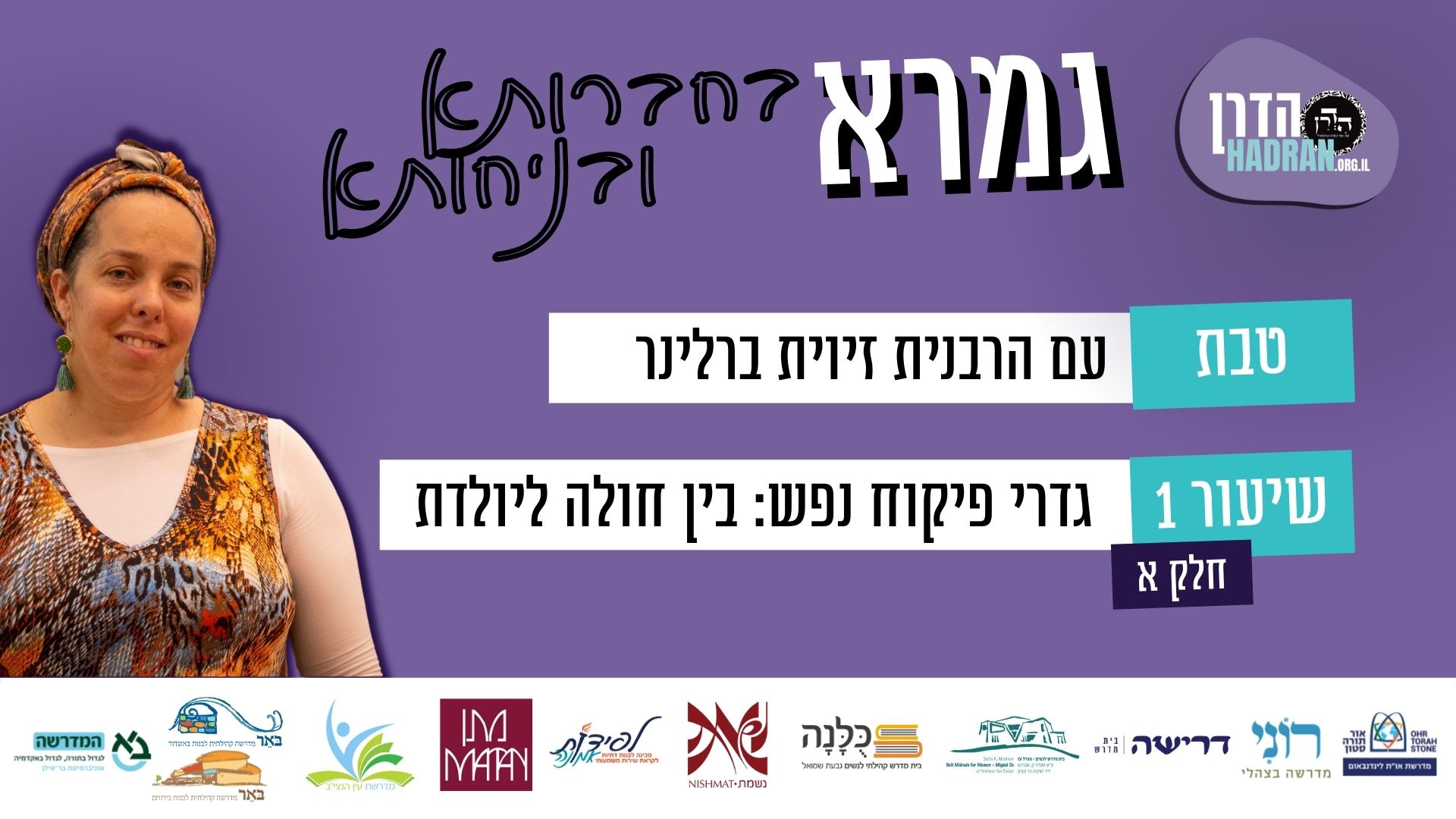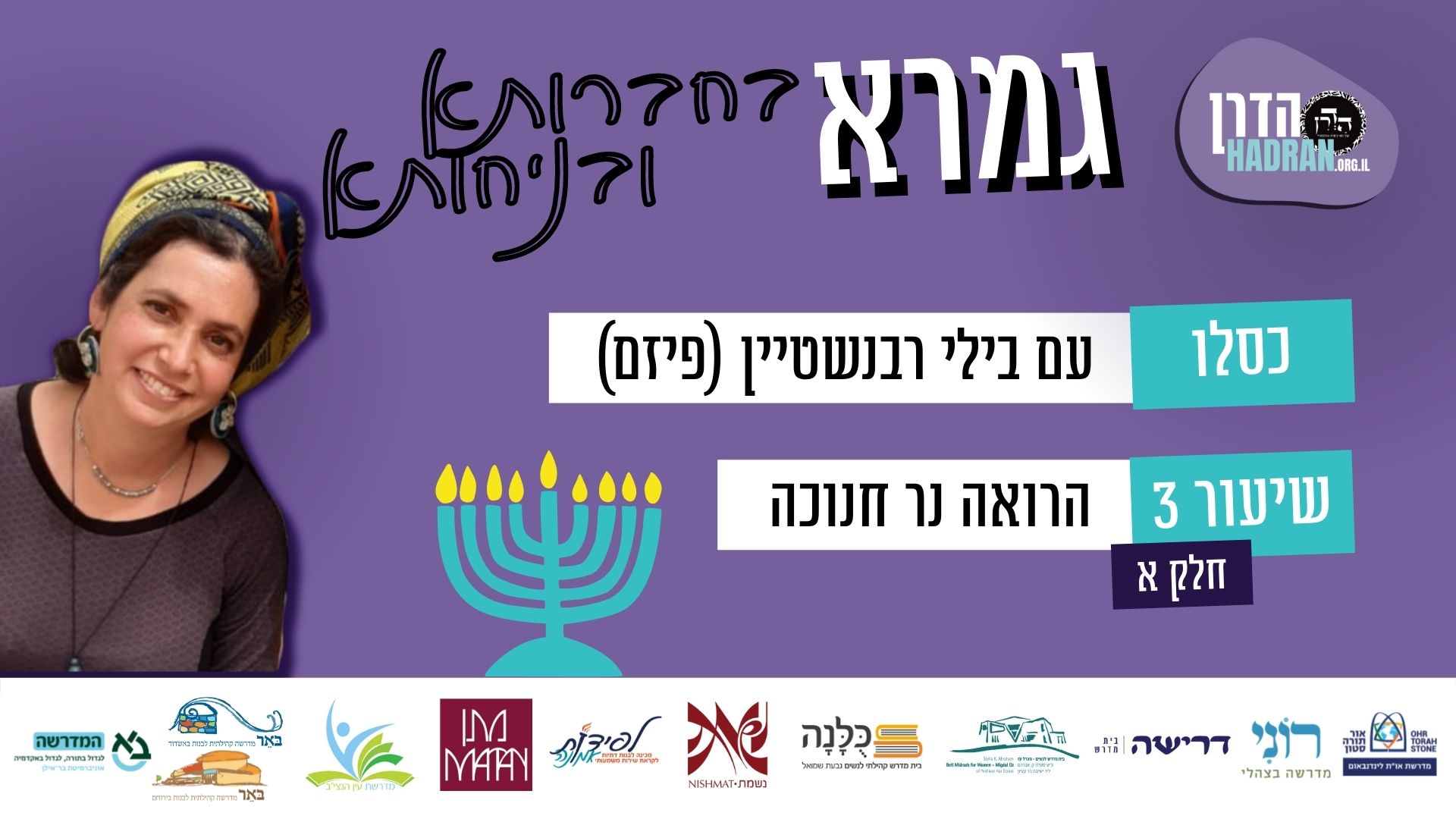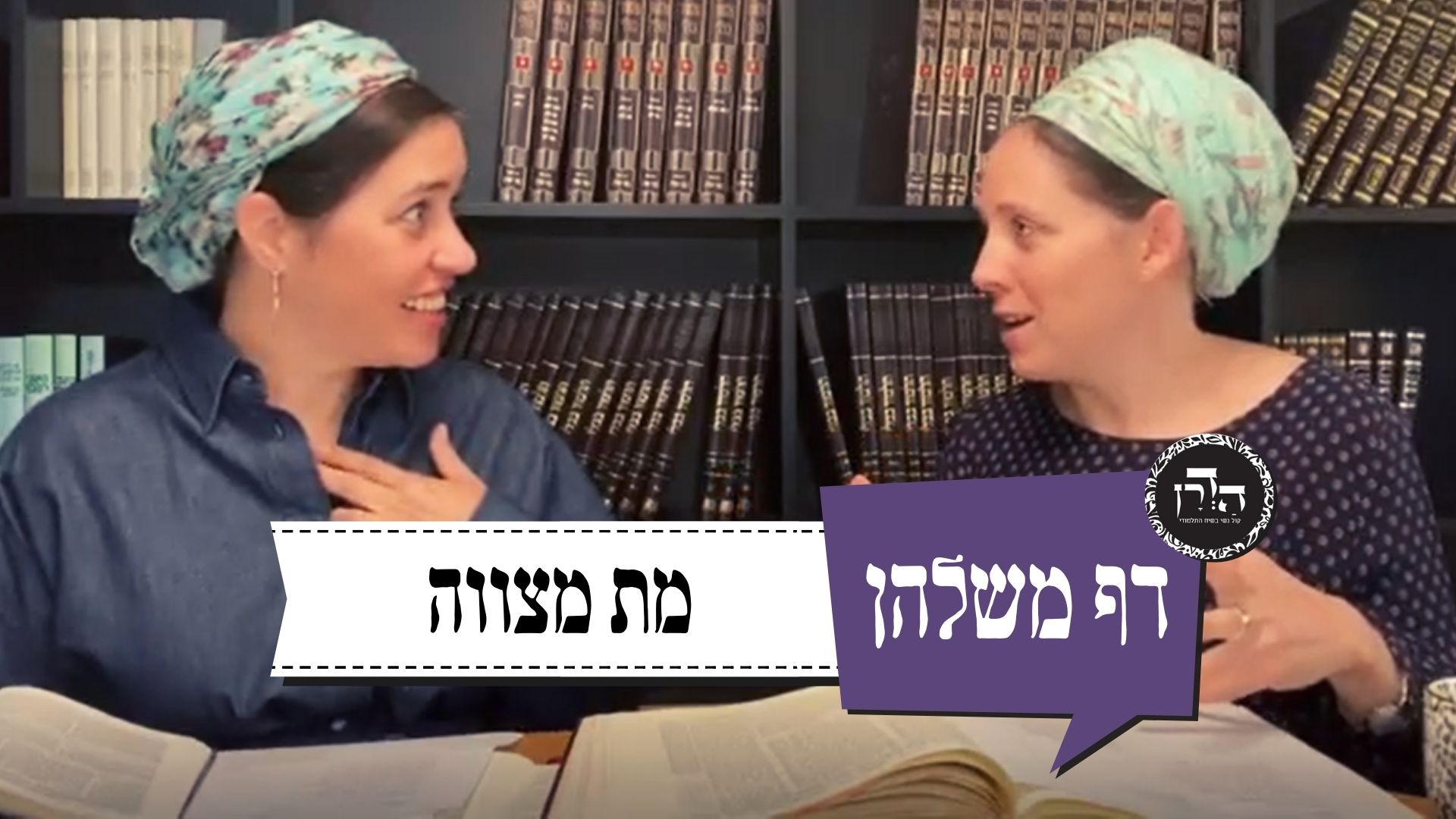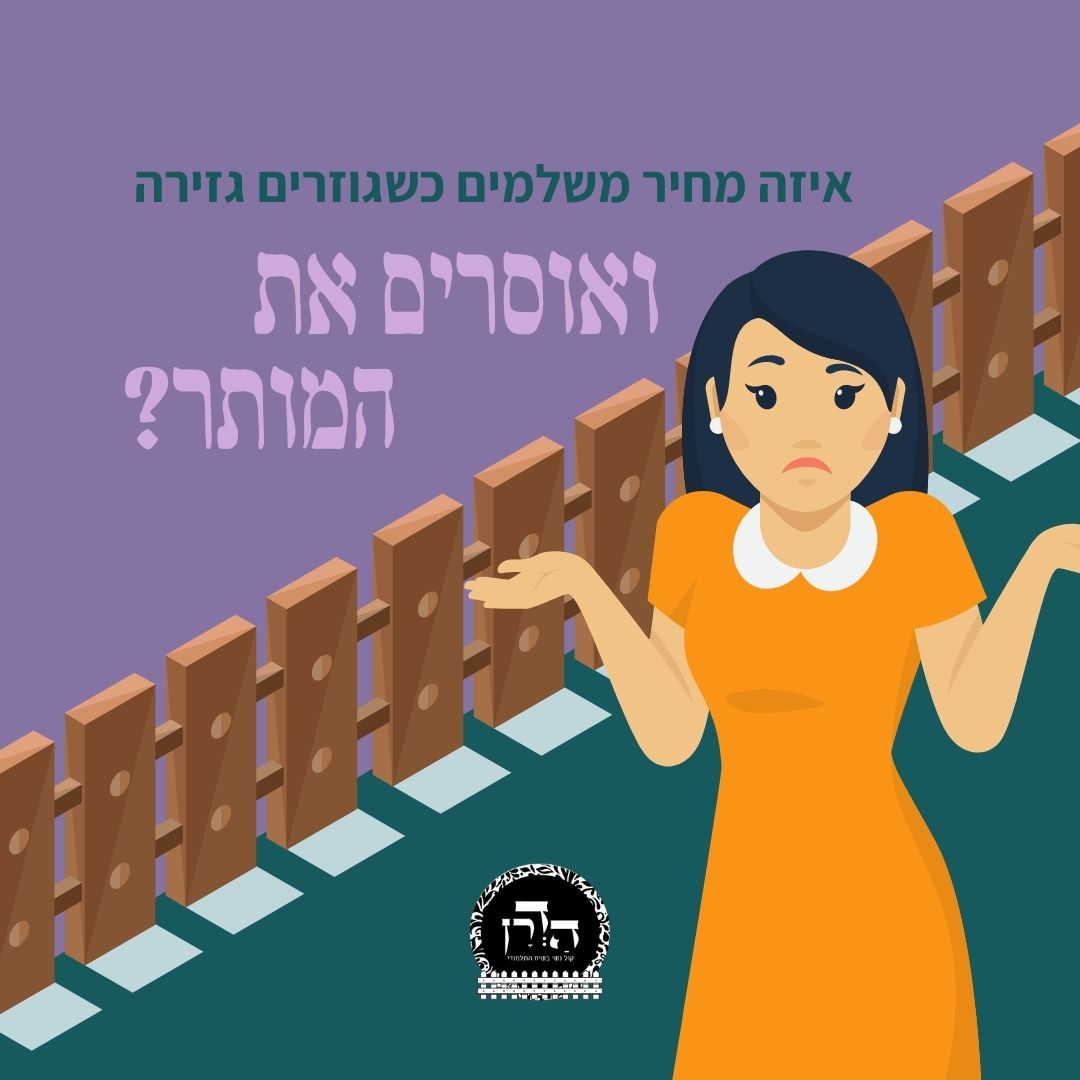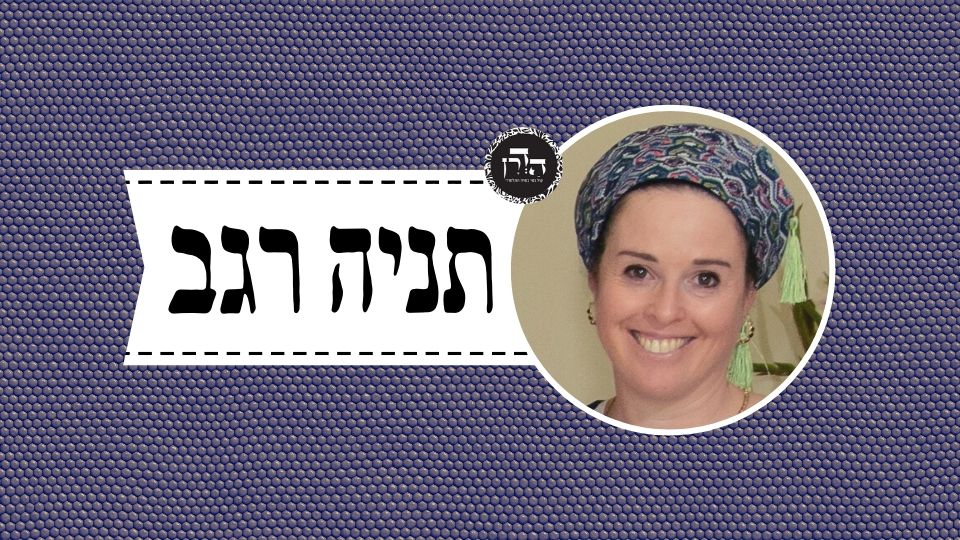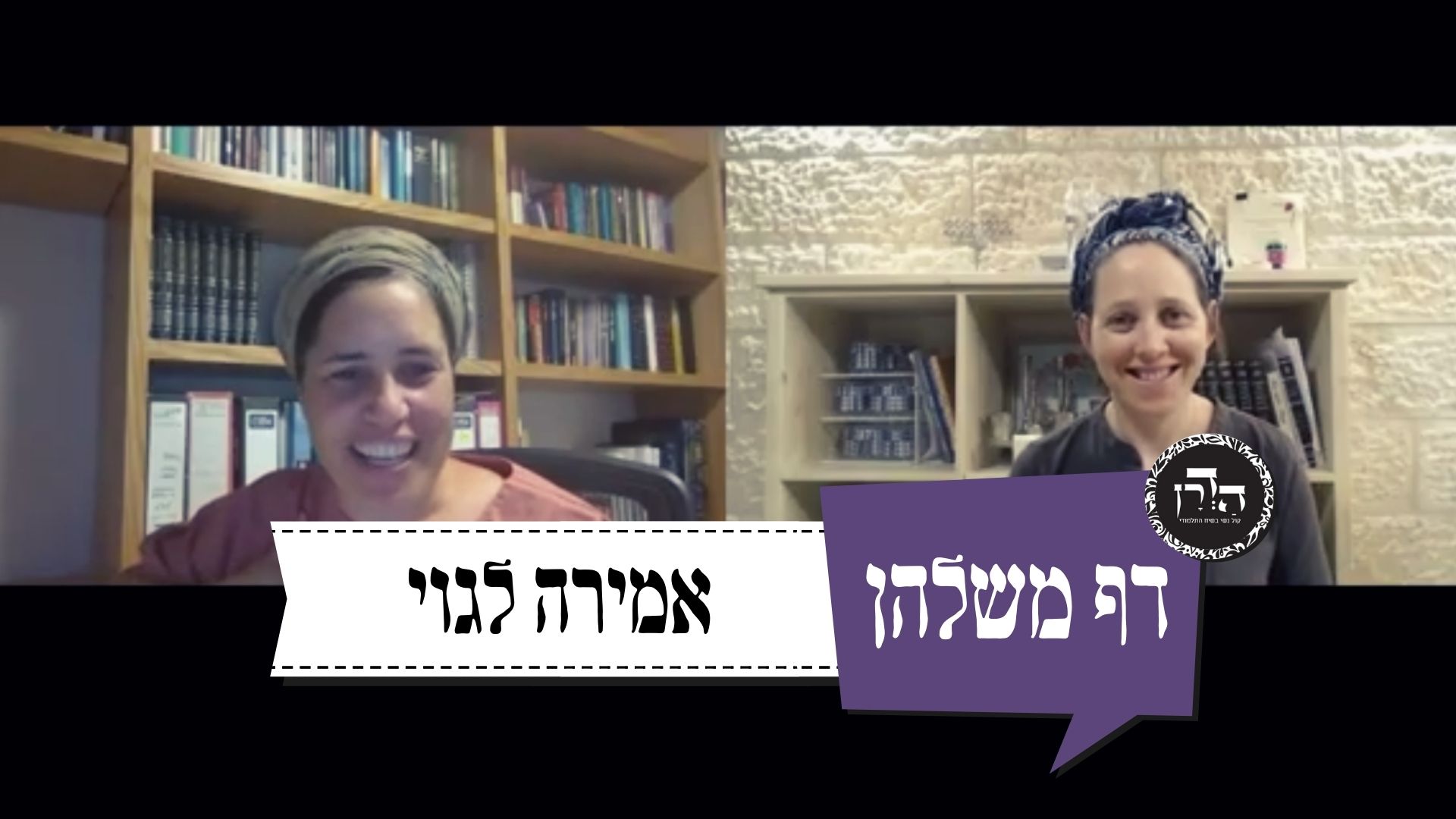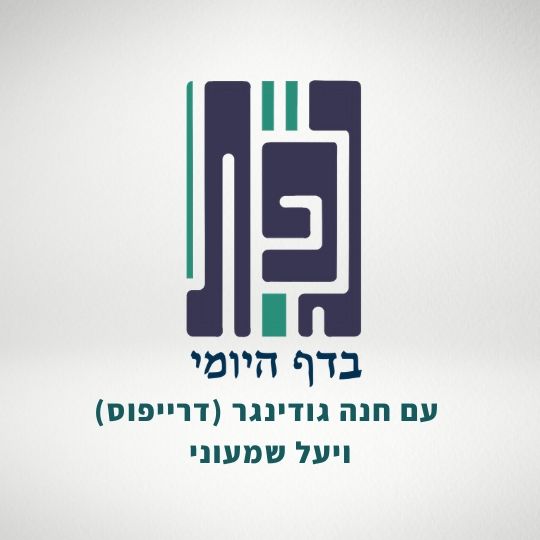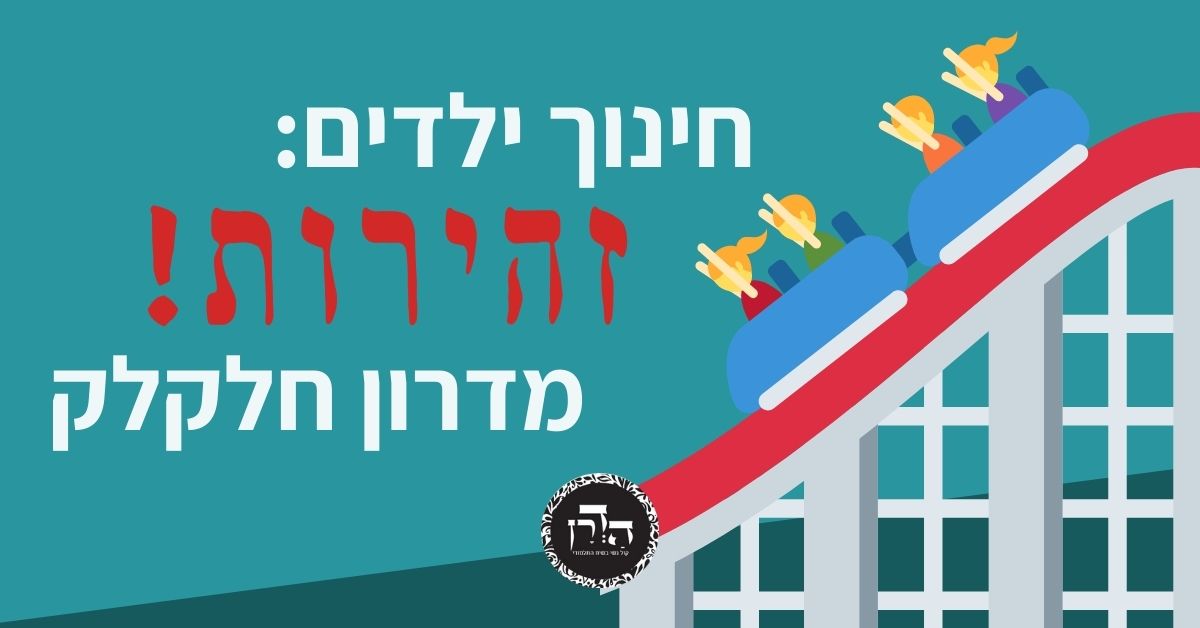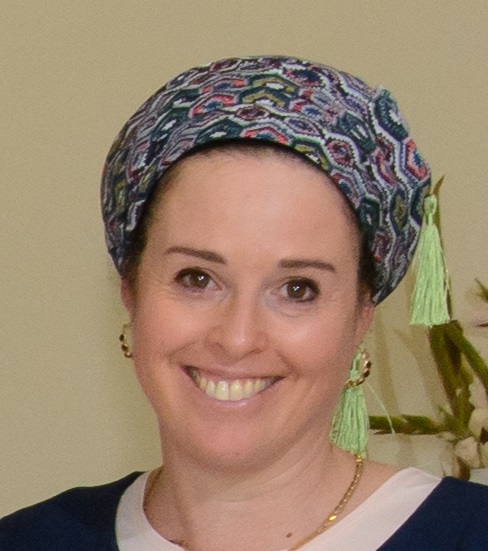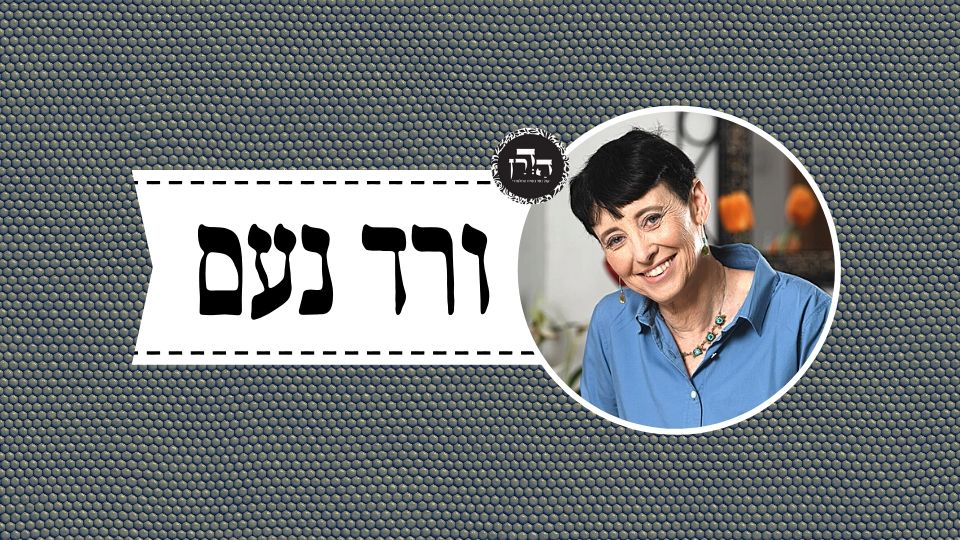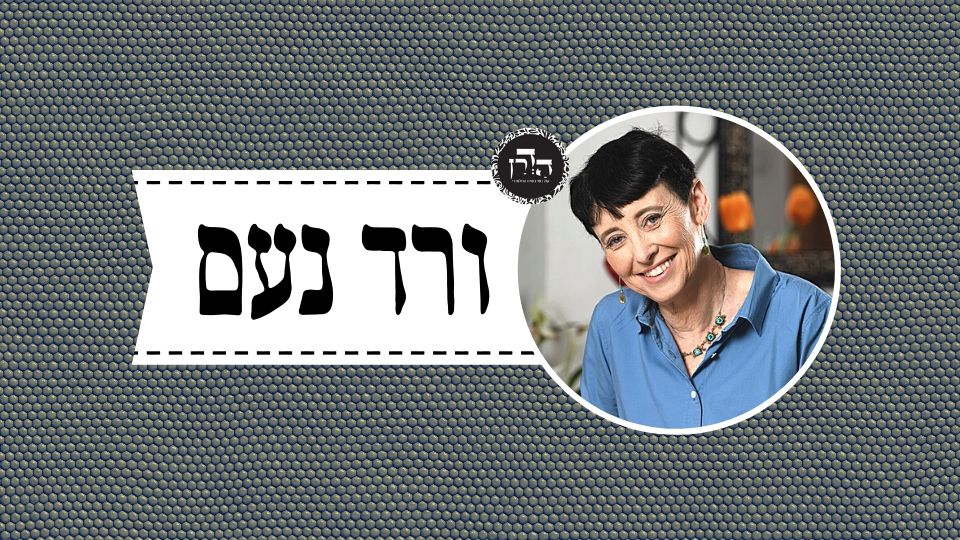שבת קטו
מוּתָּר בִּקְנִיבַת יָרָק. (וְאָמַר רַבִּי חִיָּיא בַּר אַבָּא אָמַר רַבִּי יוֹחָנָן: יוֹם כִּיפּוּרִים שֶׁחָל לִהְיוֹת בַּחוֹל) מְפַצְּעִין בֶּאֱגוֹזִים וּמְפַרְכְּסִין בְּרִימּוֹנִים מִן הַמִּנְחָה וּלְמַעְלָה מִפְּנֵי עׇגְמַת נֶפֶשׁ. דְּבֵי רַב יְהוּדָה מְקַנְּבִי כְּרָבָא. דְּבֵי רַבָּה גָּרְדִי קָארֵי. כֵּיוָן דַּחֲזָא דַּהֲווֹ קָא מְחָרְפִי, אֲמַר לְהוּ: אֲתַאי אִיגַּרְתָּא מִמַּעְרְבָא מִשְּׁמֵיהּ דְּרַבִּי יוֹחָנָן דַּאֲסִיר.
trimming vegetables is permitted. And Rabbi Ḥiyya bar Abba said that Rabbi Yoḥanan said: If Yom Kippur occurs on a weekday, one may crack nuts and remove pomegranate seeds from the late afternoon and onward, because doing so involves no actual labor and due to anxiety, i.e., if a person does not know that there is food prepared for when the fast ends, he suffers more during the final hours of the day (Rabbi Zeraḥia HaLevi). The Gemara relates: The members of Rav Yehuda’s house would trim cabbage. The members of Rabba’s house would scrub gourds. Once Rabba saw that they were doing this early, before the late afternoon, he said to them: A letter came from the West, i.e., from Eretz Yisrael, in the name of Rabbi Yoḥanan, saying that doing so is prohibited.
הדרן עלך ואלו קשרים
מַתְנִי׳ כׇּל כִּתְבֵי הַקֹּדֶשׁ מַצִּילִין אוֹתָן מִפְּנֵי הַדְּלֵיקָה, בֵּין שֶׁקּוֹרִין בָּהֶן, וּבֵין שֶׁאֵין קוֹרִין בָּהֶן. אַף עַל פִּי שֶׁכְּתוּבִים בְּכׇל לָשׁוֹן, טְעוּנִים גְּנִיזָה. וּמִפְּנֵי מָה אֵין קוֹרִין בָּהֶם — מִפְּנֵי בִּיטּוּל בֵּית הַמִּדְרָשׁ.
MISHNA: With regard to all sacred writings, one may rescue them from the fire on Shabbat, whether they are read in public, e.g., Torah or Prophets scrolls, or whether they are not read in public, e.g., Writings scrolls. This ruling applies even though they were written in any foreign language. According to the Rabbis, those scrolls are not read in public, but they are still sacred and require burial. And why does one not read the Writings on Shabbat? Due to suspension of Torah study in the study hall. People came to the study hall at specific times on Shabbat to hear words of halakha, and other texts were not allowed at those times.
גְּמָ׳ אִיתְּמַר: הָיוּ כְּתוּבִים תַּרְגּוּם אוֹ בְּכׇל לָשׁוֹן, רַב הוּנָא אָמַר: אֵין מַצִּילִין אוֹתָן מִפְּנֵי הַדְּלֵיקָה, וְרַב חִסְדָּא אָמַר: מַצִּילִין אוֹתָן מִפְּנֵי הַדְּלֵיקָה. אַלִּיבָּא דְּמַאן דְּאָמַר נִיתְּנוּ לִקְרוֹת בָּהֶן — דְּכוּלֵּי עָלְמָא לָא פְּלִיגִי דְּמַצִּילִין. כִּי פְּלִיגִי אַלִּיבָּא דְּמַאן דְּאָמַר לֹא נִיתְּנוּ לִקְרוֹת בָּהֶן. רַב הוּנָא אָמַר: אֵין מַצִּילִין, דְּהָא לֹא נִיתְּנוּ לִקְרוֹת בָּהֶן. רַב חִסְדָּא: אָמַר מַצִּילִין מִשּׁוּם בִּזְיוֹן כִּתְבֵי הַקֹּדֶשׁ. תְּנַן: כׇּל כִּתְבֵי הַקֹּדֶשׁ מַצִּילִין אוֹתָן מִפְּנֵי הַדְּלֵיקָה, בֵּין שֶׁקּוֹרִין בָּהֶן בֵּין שֶׁאֵין קוֹרִין בָּהֶן, אַף עַל פִּי שֶׁכְּתוּבִין בְּכׇל לָשׁוֹן. מַאי לָאו, ״שֶׁקּוֹרִין בָּהֶן״ — נְבִיאִים, ״וְשֶׁאֵין קוֹרִין בָּהֶן״ — כְּתוּבִים, ״אַף עַל פִּי שֶׁכְּתוּבִין בְּכׇל לָשׁוֹן״ — דְּלֹא נִיתְּנוּ לִקְרוֹת בָּהֶן, וְקָתָנֵי: מַצִּילִין, וּתְיוּבְתָּא דְרַב הוּנָא!
GEMARA: It was stated that amora’im debated the status of sacred writings written in Aramaic translation or in any other language. Rav Huna said: One may not rescue them from the fire on Shabbat. And Rav Ḥisda said: One may rescue them from the fire on Shabbat. The Gemara adds: According to the one who said that sacred writings written in other languages may be read, everybody agrees that one may rescue them. Where they argue is according to the one who said that they may not be read. Rav Huna said: One may not rescue them, as they may not be read. Whereas Rav Ḥisda said: One may rescue them due to disgrace to sacred writings that will result. We learned in the mishna: With regard to all sacred writings, one may rescue them from the fire on Shabbat whether they are read in public or whether they are not read in public, even if they are written in any foreign language. What, is it not that the phrase: “That they are read” is referring to the books of the Prophets, and the phrase: “That they are not read” is referring to the Writings? Even though these are books written in any foreign language, which may not be read, it is taught that one may save them. This then is a conclusive refutation of the opinion of Rav Huna.
אָמַר לְךָ רַב הוּנָא: וְתִסְבְּרָא? אֵימָא סֵיפָא: טְעוּנִין גְּנִיזָה — הַשְׁתָּא אַצּוֹלֵי מַצִּילִּינַן, גְּנִיזָה מִיבְּעֵי? אֶלָּא, רַב הוּנָא מְתָרֵץ לְטַעְמֵיהּ, וְרַב חִסְדָּא מְתָרֵץ לְטַעְמֵיהּ. רַב הוּנָא מְתָרֵץ לְטַעְמֵיהּ: ״בֵּין שֶׁקּוֹרִין בָּהֶם״ — נְבִיאִים, ״וּבֵין שֶׁאֵין קוֹרִין בָּהֶם״ — כְּתוּבִים. בַּמֶּה דְּבָרִים אֲמוּרִים — שֶׁכְּתוּבִין בִּלְשׁוֹן הַקֹּדֶשׁ, אֲבָל בְּכׇל לָשׁוֹן — אֵין מַצִּילִין, וַאֲפִילּוּ הָכִי גְּנִיזָה בָּעוּ. רַב חִסְדָּא מְתָרֵץ לְטַעְמֵיהּ: ״בֵּין שֶׁקּוֹרִין בָּהֶן״ — נְבִיאִים, ״וּבֵין שֶׁאֵין קוֹרִין בָּהֶן״ — כְּתוּבִים, אַף עַל פִּי שֶׁכְּתוּבִין בְּכׇל לָשׁוֹן, נָמֵי מַצִּילִין. וְהָכִי קָאָמַר: וּמְקָק שֶׁלָּהֶן טְעוּנִין גְּנִיזָה.
Rav Huna could have said to you: And do you understand the mishna that way? Say the latter clause of the mishna, which states: They require burial. This is unnecessary, as now, that it was mentioned that we rescue them from the fire, is it necessary to say that they require burial? Rather, the mishna must be emended. Rav Huna reconciles the mishna in accordance with his reasoning, and Rav Ḥisda reconciles the mishna in accordance with his reasoning. Rav Huna reconciles this in accordance with his reasoning: Whether they are read is referring to the Prophets, and whether they are not read is referring to the Writings. In what case is this statement said? It is in a case where they are written in the holy tongue, but if they are not written in Hebrew but in any other language, they are not rescued from the fire on Shabbat, and even so, they require burial. Rav Ḥisda reconciles the mishna in accordance with his reasoning: Whether they are read is referring to the Prophets, and whether they are not read is referring to the Writings, even if they are written in any language other than Hebrew, they are also rescued. And this is what the mishna is saying: And even the decayed sections of parchment require burial.
מֵיתִיבִי: הָיוּ כְּתוּבִים תַּרְגּוּם וְכׇל לָשׁוֹן — מַצִּילִין אוֹתָן מִפְּנֵי הַדְּלֵיקָה. תְּיוּבְתָּא דְרַב הוּנָא! אָמַר לְךָ רַב הוּנָא: הַאי תַּנָּא סָבַר נִיתְּנוּ לִקְרוֹת בָּהֶן. תָּא שְׁמַע: הָיוּ כְּתוּבִין גִּיפְטִית, מָדִית, עִיבְרִית, עֵילָמִית, יְווֹנִית, אַף עַל פִּי שֶׁלֹּא נִיתְּנוּ לִקְרוֹת בָּהֶן — מַצִּילִין אוֹתָן מִפְּנֵי הַדְּלֵיקָה. תְּיוּבְתָּא דְרַב הוּנָא! אָמַר לְךָ רַב הוּנָא: תַּנָּאֵי הִיא, דְּתַנְיָא: הָיוּ כְּתוּבִין תַּרְגּוּם וּבְכָל לָשׁוֹן — מַצִּילִין אוֹתָן מִפְּנֵי הַדְּלֵיקָה. רַבִּי יוֹסֵי אוֹמֵר: אֵין מַצִּילִין אוֹתָן מִפְּנֵי הַדְּלֵיקָה.
The Gemara raises an objection from that which was taught in a baraita: If they were written in Aramaic translation or in any language other than Hebrew, they are rescued from the fire on Shabbat. And this is a conclusive refutation of the opinion of Rav Huna, who states that these are not rescued. Rav Huna could have said to you: This tanna holds that sacred writings not written in Hebrew may be read, whereas Rav Huna stated his ruling in accordance with the opinion of the tanna who holds that they may not be read, and therefore may not be rescued. Come and hear another proof from that which was taught in a different baraita: Sacred writings that were written in Coptic, Egyptian; Median; Ivrit, i.e., ancient Hebrew script; Eilamitic; or Greek are rescued from the fire on Shabbat, even though they may not be read. This is a conclusive refutation of the opinion of Rav Huna, who holds that they are not rescued. Rav Huna could have said to you: This is a dispute between tanna’im, as it was taught in a baraita: If they were written in Aramaic translation or in any language other than Hebrew, one may rescue them from the fire on Shabbat. Rabbi Yosei says: One may not rescue them from the fire.
אָמַר רַבִּי יוֹסֵי: מַעֲשֶׂה בְּאַבָּא חֲלַפְתָּא שֶׁהָלַךְ אֵצֶל רַבָּן גַּמְלִיאֵל בְּרִיבִּי לִטְבֶרְיָא, וּמְצָאוֹ שֶׁהָיָה יוֹשֵׁב עַל שֻׁלְחָנוֹ שֶׁל יוֹחָנָן הַנָּזוּף וּבְיָדוֹ סֵפֶר אִיּוֹב תַּרְגּוּם, וְהוּא קוֹרֵא בּוֹ. אָמַר לוֹ: זָכוּר אֲנִי בְּרַבָּן גַּמְלִיאֵל אֲבִי אָבִיךָ שֶׁהָיָה עוֹמֵד עַל גַּבֵּי מַעֲלָה בְּהַר הַבַּיִת, וְהֵבִיאוּ לְפָנָיו סֵפֶר אִיּוֹב תַּרְגּוּם, וְאָמַר לַבַּנַּאי: שַׁקְּעֵהוּ תַּחַת הַנִּדְבָּךְ. אַף הוּא צִוָּה עָלָיו וּגְנָזוֹ. רַבִּי יוֹסֵי בְּרַבִּי יְהוּדָה אוֹמֵר: עֲרֵיבָה שֶׁל טִיט כָּפוּ עָלָיו. אָמַר רַבִּי, שְׁתֵּי תְּשׁוּבוֹת בַּדָּבָר: חֲדָא, וְכִי טִיט בְּהַר הַבַּיִת מִנַּיִן? וְעוֹד, וְכִי מוּתָּר לְאַבְּדָן בַּיָּד? אֶלָּא מַנִּיחָן בִּמְקוֹם הַתּוּרְפָּה וְהֵן מַרְקִיבִין מֵאֲלֵיהֶן. מַאן תַּנָּאֵי
Rabbi Yosei said: There was an incident involving my father, Ḥalafta, who went to the esteemed Rabban Gamliel of Yavne in Tiberias, where he found him sitting at the table of Yoḥanan HaNazuf and in his hand there was a translation of the book of Job, and he was reading from it. Yoḥanan said to Rabban Gamliel of Yavne: I remember Rabban Gamliel, your father’s father, who was standing on top of a step on the Temple Mount. And they brought before him a translation of the book of Job, and he said to the builder: Bury this book under the course of bricks. When he heard of that incident, Rabban Gamliel of Yavne ordered that it be buried and he buried it. Rabbi Yosei, son of Rabbi Yehuda, says that on the Temple Mount they overturned a large bowl of mortar on it. Rabbi Yehuda HaNasi said: There are two responses to this that prove that it did not happen: One, from where would they get mortar on the Temple Mount? Construction on the Temple Mount was performed with other materials, not with mortar. And furthermore, is it permitted to actively destroy even sacred writings that are not read, with one’s hands? Rather, at the very least they leave them in a neglected place, where they are likely to decompose quickly, and they decay on their own. The Gemara seeks to clarify: Who are the tanna’im who dispute this halakha according to Rav Huna?
אִילֵּימָא תַּנָּא קַמָּא דְּרַבִּי יוֹסֵי — וְדִילְמָא בְּהָא קָמִיפַּלְגִי, מָר סָבַר: נִיתְּנוּ לִקְרוֹת בָּהֶן, וּמָר סָבַר: לֹא נִיתְּנוּ לִקְרוֹת בָּהֶן. אֶלָּא רַבִּי יוֹסֵי וְתַנָּא דְּגִיפְטִית.
If we say it is the first tanna who disagrees with Rabbi Yosei, that is not necessarily so, and perhaps they are disagreeing about this: This Master, the first tanna, holds that books written in other languages may be read; and this Master, Rabbi Yosei, holds that they may not be read, and their dispute is unrelated to the dispute between Rav Huna and Rav Ḥisda. Rather, it is the dispute between Rabbi Yosei and the first tanna, who spoke about books written in Coptic. According to that tanna, even books that may not be read are rescued, whereas Rabbi Yosei holds that they are not rescued.
תָּנוּ רַבָּנַן: הַבְּרָכוֹת וְהַקְּמֵיעִין, אַף עַל פִּי שֶׁיֵּשׁ בָּהֶן אוֹתִיּוֹת שֶׁל שֵׁם וּמֵעִנְיָינוֹת הַרְבֵּה שֶׁבַּתּוֹרָה — אֵין מַצִּילִין אוֹתָן מִפְּנֵי הַדְּלֵיקָה, אֶלָּא נִשְׂרָפִים בִּמְקוֹמָן [הֵן וְאַזְכָּרוֹתֵיהֶן]. מִכָּאן אָמְרוּ: כּוֹתְבֵי בְרָכוֹת כְּשׂוֹרְפֵי תוֹרָה. מַעֲשֶׂה בְּאֶחָד שֶׁהָיָה כּוֹתֵב בְּצַיְדָּן, בָּאוּ וְהוֹדִיעוּ אֶת רַבִּי יִשְׁמָעֵאל, וְהָלַךְ רַבִּי יִשְׁמָעֵאל לְבוֹדְקוֹ. כְּשֶׁהָיָה עוֹלֶה בַּסּוּלָּם הִרְגִּישׁ בּוֹ, נָטַל טוֹמוֹס שֶׁל בְּרָכוֹת וְשִׁקְּעָן בְּסֵפֶל שֶׁל מַיִם. וּבַלָּשׁוֹן הַזֶּה אָמַר לוֹ רַבִּי יִשְׁמָעֵאל: גָּדוֹל עוֹנֶשׁ הָאַחֲרוֹן מִן הָרִאשׁוֹן.
The Sages taught in a baraita: The blessings that are written and the amulets, even though there are the letters of the Name of God in them and matters that appear in the Torah are mentioned in them, they are not rescued from the fire; rather, they burn in their place, they and the names of God contained therein. From here the Sages said: Writers of blessings are like burners of Torah scrolls, as it is prohibited to rescue these texts from the fire on Shabbat even though it is likely that they will be destroyed. There was an incident involving one who was writing pages with blessings in Sidon. They came and informed Rabbi Yishmael of his actions, and Rabbi Yishmael went to examine him to determine if the report was true. When Rabbi Yishmael was ascending the ladder to confront him, the scribe sensed his presence, took a bundle [tomos] of blessings, and submerged it in a basin of water to conceal it from Rabbi Yishmael. And in these words Rabbi Yishmael said to him: The punishment for the latter action is greater than the punishment for the former. Although it is prohibited to write blessings, destroying them is a greater violation.
בְּעָא מִינֵּיהּ רֵישׁ גָּלוּתָא מֵרַבָּה בַּר רַב הוּנָא: הָיוּ כְּתוּבִין בְּסַם וּבְסִיקְרָא בְּקוֹמוֹס וּבְקַנְקַנְתּוֹם, בִּלְשׁוֹן הַקֹּדֶשׁ, מַצִּילִין אוֹתָן מִפְּנֵי הַדְּלֵיקָה אוֹ אֵין מַצִּילִין? תִּיבְּעֵי לְמַאן דְּאָמַר מַצִּילִין, תִּיבְּעֵי לְמַאן דְּאָמַר אֵין מַצִּילִין. תִּיבְּעֵי לְמַאן דְּאָמַר אֵין מַצִּילִין — הָנֵי מִילֵּי הֵיכָא דִּכְתִיבִי תַּרְגּוּם וּבְכָל לָשׁוֹן, אֲבָל הָכָא דִּכְתִיבִי בִּלְשׁוֹן הַקֹּדֶשׁ — מַצִּילִין, אוֹ דִילְמָא אֲפִילּוּ לְמַאן דְּאָמַר מַצִּילִין — הָנֵי מִילֵּי הֵיכָא דִּכְתִיבִי בִּדְיוֹ דְּמִיקַּיַּים, אֲבָל הָכָא כֵּיוָן דְּלָא מִיקַּיַּים — לָא. אֲמַר לֵיהּ: אֵין מַצִּילִין. וְהָא רַב הַמְנוּנָא תָּנָא מַצִּילִין! אֲמַר לֵיהּ: אִי תַּנְיָא — תַּנְיָא. מַאי תַּנְיָא? אָמַר רַב אָשֵׁי, כִּדְתַנְיָא: אֵין בֵּין סְפָרִים לִמְגִילָּה אֶלָּא שֶׁהַסְּפָרִים נִכְתָּבִים בְּכׇל לָשׁוֹן, וּמְגִילָּה עַד שֶׁתְּהֵא כְּתוּבָה אַשּׁוּרִית, עַל הַסֵּפֶר, וּבִדְיוֹ.
The Exilarch raised a dilemma before Rabba bar Rav Huna: If the sacred scrolls were written in yellow-tinged arsenic, or red paint, in gum, or in iron sulfate, types of ink which may not be used to write Torah scrolls; however, the scrolls were written properly in the holy tongue, does one rescue them from the fire on Shabbat or does one not rescue them? The Gemara adds: This dilemma is raised according to the one who said that one rescues sacred writings written in other languages; and this dilemma is raised according to the one who said that one does not rescue them. The Gemara elaborates. This dilemma is raised according to the one who said that one does not rescue them: Perhaps that applies specifically in a case where they are written in Aramaic translation and in any foreign language; however, here, where they are written in the holy tongue, one rescues them. Or perhaps even according to the one who said that one rescues them, that applies specifically in a case where they are written in ink that endures; however, here, since the script does not endure, they are not rescued. Rabba bar Rav Huna said to him: One does not rescue them. The Exilarch said to him: Didn’t Rav Hamnuna teach in a baraita that one saves them. Rabba bar Rav Huna said to him: If it was taught in a baraita, it was taught, and I retract my statement. The Gemara asks: What is the baraita that was taught on this matter? Rav Ashi said, as it was taught in a baraita: The only difference between the books of the Bible and the Megilla of Esther is that the books are written in any language and are valid, and the Megilla is only valid if it is written in Assyrian script, the familiar square Hebrew script, on a parchment scroll, and in ink. Apparently, other sacred books need not be written in ink.
בְּעָא מִינֵּיהּ רַב הוּנָא בַּר חֲלוּב מֵרַב נַחְמָן: סֵפֶר תּוֹרָה שֶׁאֵין בּוֹ לְלַקֵּט שְׁמוֹנִים וְחָמֵשׁ אוֹתִיּוֹת, כְּגוֹן פָּרָשַׁת ״וַיְהִי בִּנְסוֹעַ הָאָרוֹן״, מַצִּילִין אוֹתָן מִפְּנֵי הַדְּלֵיקָה, אוֹ אֵין מַצִּילִין? אֲמַר לֵיהּ: וְתִיבְּעֵי לָךְ פָּרָשַׁת ״וַיְהִי בִּנְסוֹעַ הָאָרוֹן״ גּוּפַהּ? הֵיכָא דְּחָסַר פָּרָשַׁת ״וַיְהִי בִּנְסוֹעַ״ — לָא קָמִיבַּעְיָא לִי, דְּכֵיוָן דְּאִית בֵּיהּ הַזְכָּרוֹת, אַף עַל גַּב דְּלֵית בֵּיהּ שְׁמוֹנִים וְחָמֵשׁ אוֹתִיּוֹת — מַצִּילִין. כִּי קָא מִיבַּעְיָא לִי סֵפֶר תּוֹרָה שֶׁאֵין בּוֹ לְלַקֵּט, מַאי? אֲמַר לֵיהּ: אֵין מַצִּילִין.
Rav Huna bar Ḥaluv raised a dilemma before Rav Naḥman: With regard to a Torah scroll in which there is not enough to compile from it eighty-five complete letters written properly and in order, which is the minimum measure determined by the Sages for a Torah to maintain the sanctity of a Torah scroll, as in the portion of: “And when the Ark traveled” (Numbers 10:35–36), does one rescue it from the fire on Shabbat or does one not rescue it? Rav Naḥman said to him: And raise a dilemma with regard to the portion of: “And when the Ark traveled,” itself, i.e., does one rescue it on Shabbat if it is missing a single letter? Rav Huna bar Ḥaluv answered: In a case where the portion of: “And when the Ark traveled,” is incomplete, it is not a dilemma for me, as since it contains names of God, even though there are not eighty-five letters in it, it is rescued. However, the case where it is a dilemma for me is with regard to a Torah scroll in which there is not enough to compile from it eighty-five complete letters; what is the ruling? Is it rescued on Shabbat or not? Rav Naḥman said to him: It is not rescued.
אֵיתִיבֵיהּ: תַּרְגּוּם שֶׁכְּתָבוֹ מִקְרָא, וּמִקְרָא שֶׁכְּתָבוֹ תַּרְגּוּם, וּכְתָב עִבְרִית — מַצִּילִין מִפְּנֵי הַדְּלֵיקָה. וְאֵין צָרִיךְ לוֹמַר תַּרְגּוּם שֶׁבְּעֶזְרָא וְשֶׁבְּדָנִיאֵל וְשֶׁבַּתּוֹרָה. תַּרְגּוּם שֶׁבַּתּוֹרָה מַאי נִיהוּ? — ״יְגַר שָׂהֲדוּתָא״, וְאַף עַל גַּב דְּלֵית בַּהּ שְׁמוֹנִים וְחָמֵשׁ אוֹתִיּוֹת! כִּי תַּנְיָא הַהִיא — לְהַשְׁלִים.
Rav Huna bar Ḥaluv raised an objection to his opinion from that which we learned: A verse that is originally written in Aramaic translation that was written in the language of the Bible, and a verse that is originally written in the language of the Bible that was written in Aramaic translation, and a Torah that was written in ancient Hebrew script, one rescues them from the fire on Shabbat. And, needless to say, one saves the verses written in Aramaic translation that are in the book of Ezra, and that are in the book of Daniel, and that are in the Torah. What are the verses originally written in Aramaic translation in the Torah? It is the verse: “And Laban called it Yegar Sahaduta, and Jacob called it Gal Ed” (Genesis 31:47), and apparently, it is rescued, even though there are not eighty-five letters in it. Rav Naḥman answered him: That is no proof, as when that baraita was taught, it was in a case where the Aramaic verse is counted to complete the total of eighty-five letters, but it is not independently significant.
אִיבַּעְיָא לְהוּ: הָנֵי שְׁמוֹנִים וְחָמֵשׁ אוֹתִיּוֹת, מְכוּנָּסוֹת אוֹ מְפוּזָּרוֹת? רַב הוּנָא אָמַר: מְכוּנָּסוֹת. רַב חִסְדָּא אָמַר: אֲפִילּוּ מְפוּזָּרוֹת. מֵיתִיבִי: סֵפֶר תּוֹרָה שֶׁבָּלָה, אִם יֵשׁ בּוֹ לְלַקֵּט שְׁמוֹנִים וְחָמֵשׁ אוֹתִיּוֹת, כְּגוֹן פָּרָשַׁת ״וַיְהִי בִּנְסוֹעַ הָאָרוֹן״ — מַצִּילִין, וְאִם לָאו — אֵין מַצִּילִין. תְּיוּבְתָּא דְרַב הוּנָא! תַּרְגְּמַהּ רַב חִסְדָּא אַלִּיבָּא דְרַב הוּנָא בְּתֵיבוֹת.
A dilemma was raised before the Sages: With regard to these eighty-five letters that allow one to rescue a Torah scroll, is that specifically when they are juxtaposed, or even when they are scattered? Rav Huna said: Only when they are juxtaposed. Rav Ḥisda said: Even when they are scattered. The Gemara raises an objection from that which we learned: With regard to a Torah scroll that is worn, if there is enough to compile from it eighty-five complete letters as in the portion of: “And when the Ark traveled,” one rescues it from the fire, and if not one does not rescue it. The term: To compile, indicates that the letters are not juxtaposed, and this is a conclusive refutation of the opinion of Rav Huna. Rav Ḥisda interpreted it according to the opinion of Rav Huna: Indeed, the baraita is referring to a case where the letters are scattered, but they are juxtaposed in the form of words. In that case, even Rav Huna agrees that it is a sacred book. Rav Huna and Rav Ḥisda only disagree in a case where isolated letters are scattered.
תָּנוּ רַבָּנַן: ״וַיְהִי בִּנְסוֹעַ הָאָרוֹן וַיֹּאמֶר מֹשֶׁה״ — פָּרָשָׁה זוֹ עָשָׂה לָהּ הַקָּדוֹשׁ בָּרוּךְ הוּא סִימָנִיּוֹת מִלְּמַעְלָה וּלְמַטָּה, לוֹמַר
Apropos the portion: “And when the Ark traveled,” the Gemara cites that which the Sages taught in a baraita. It is stated: “And when the Ark traveled and Moses proclaimed: Rise up, God, and Your enemies will scatter and those who hate You will flee from before You.” And The Holy One, Blessed be He, made signs in the Torah for this portion, above and below, i.e., before and after it, in order to say



